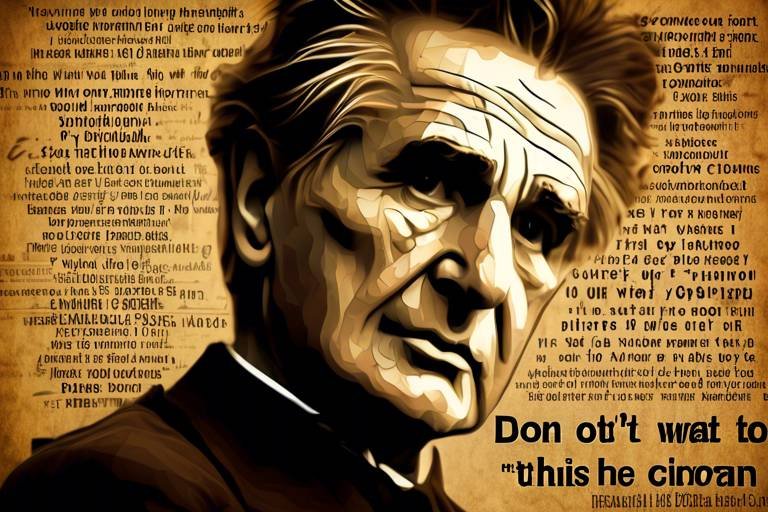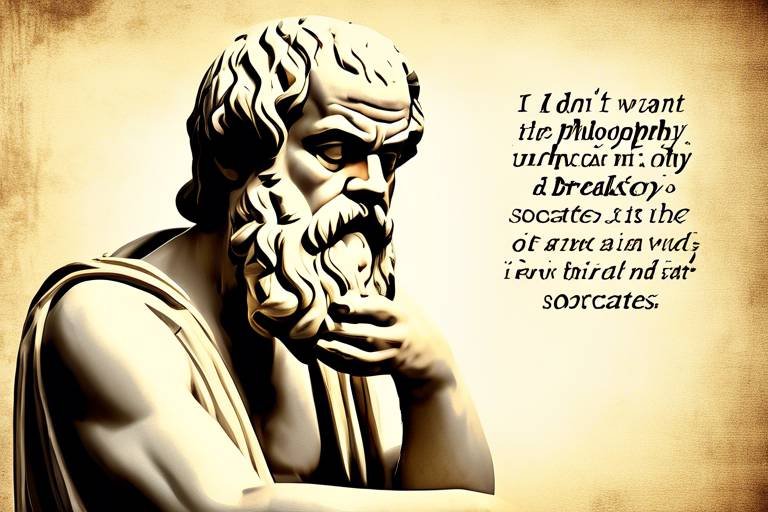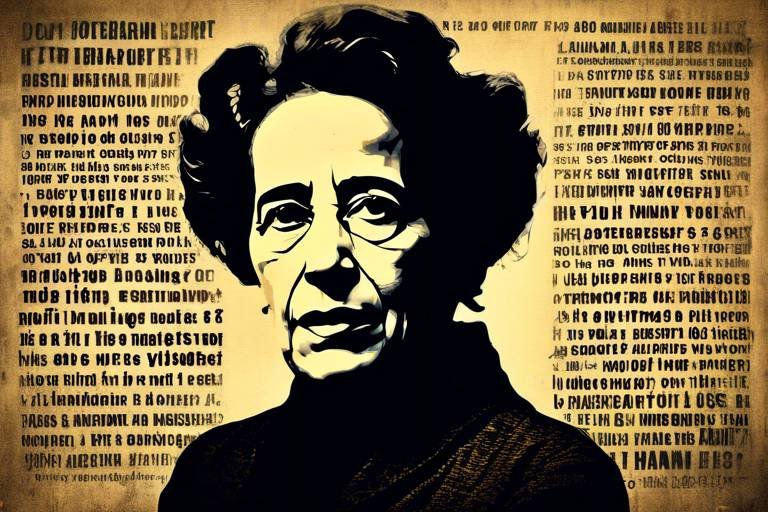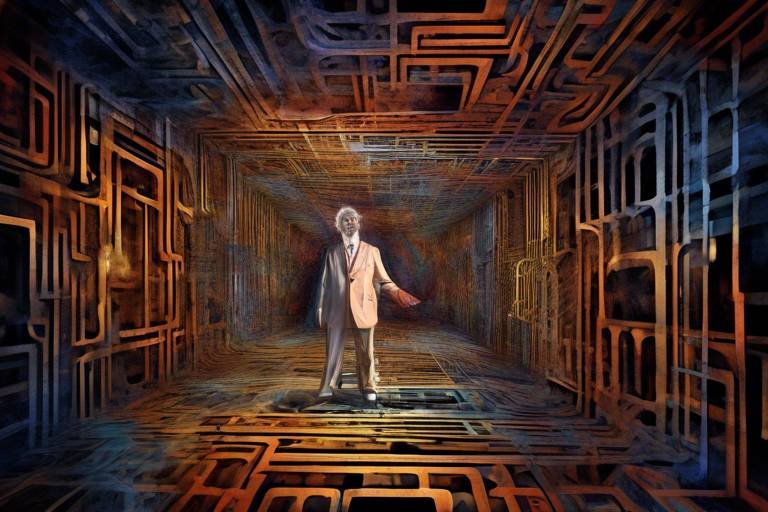Understanding the Philosophical Contributions of E.M. Cioran
E.M. Cioran, a Romanian philosopher and essayist, is a name that resonates deeply within the realms of existential thought and philosophical pessimism. His works, characterized by a profound sense of despair and a relentless examination of the human condition, invite readers to confront some of life's most uncomfortable truths. Cioran's philosophy is not just a collection of ideas; it is a journey through the shadows of existence, urging us to question the very essence of hope, meaning, and our place in the universe.
At the heart of Cioran's contributions lies a stark acknowledgment of the absurdity of life. He skillfully navigates the murky waters of pessimism, challenging the conventional notions of optimism and progress. For Cioran, despair is not merely an emotional state but a philosophical tool that can lead to deeper insights about ourselves and our surroundings. His writings resonate with those who have ever felt the weight of existence pressing down on them, offering a voice to the silent struggles of countless individuals.
Throughout his career, Cioran delved into existential themes that question the very fabric of reality. He invites us to reflect on the inevitable nature of death and the absurdity of our aspirations. This exploration is not just theoretical; it is a call to embrace the complexities of life, to confront mortality with courage, and to find meaning in the chaos. In doing so, Cioran’s work continues to inspire new generations of thinkers and seekers, bridging the gap between despair and enlightenment.
Moreover, Cioran's writings are enriched by influences from Eastern philosophies, particularly Buddhism and Taoism. These traditions emphasize detachment and the transient nature of suffering, which align closely with Cioran's own reflections. By integrating these perspectives, Cioran offers a holistic view of existence, encouraging readers to cultivate a sense of acceptance in the face of life's inherent contradictions.
In summary, E.M. Cioran's philosophical contributions are a testament to the power of introspection and the necessity of grappling with the darker aspects of existence. His work challenges us to embrace our despair, confront our mortality, and ultimately, seek a deeper understanding of what it means to be human. As we navigate through the complexities of his thought, we are reminded that even in the depths of despair, there lies the potential for profound insight and personal growth.
- Who was E.M. Cioran?
Cioran was a Romanian philosopher known for his deep insights into despair, existence, and the human condition. - What are the main themes in Cioran's work?
Main themes include pessimism, existentialism, the absurdity of life, mortality, and the influence of Eastern philosophy. - How does Cioran view despair?
Cioran sees despair as a catalyst for philosophical inquiry, suggesting that it can lead to profound insights. - What influences shaped Cioran's philosophy?
His philosophy was significantly influenced by Eastern traditions, particularly Buddhism and Taoism, which emphasize detachment and the nature of suffering.

The Essence of Pessimism
E.M. Cioran's philosophy is often characterized by a profound pessimism, a lens through which he scrutinizes the very fabric of human existence. Unlike the optimistic narratives that dominate much of contemporary thought, Cioran dives deep into the murky waters of despair, challenging the notion that hope can serve as a reliable anchor in the tumultuous sea of life. His writings are not just a reflection of his own struggles; they resonate with the universal experience of suffering and existential angst. In a world that often glorifies positivity, Cioran's perspective serves as a stark reminder of the darker aspects of our reality.
One might wonder, why embrace pessimism? For Cioran, it is not merely a gloomy outlook but a profound engagement with the truth of our existence. He argues that by confronting our despair, we can gain a clearer understanding of life itself. This is akin to peeling away the layers of an onion; each layer reveals a deeper, often uncomfortable truth about our nature and our place in the universe. His thoughts provoke readers to question the validity of their own hopes and aspirations, forcing them to confront the dissonance that often exists between what we desire and what is attainable.
Cioran's reflections lead us to consider the following key aspects of his pessimistic philosophy:
- The Illusion of Hope: Cioran posits that hope can be a deceptive force, leading individuals to cling to unrealistic expectations.
- Acceptance of Suffering: Embracing suffering as an inherent part of life can lead to a more authentic existence.
- Existential Freedom: By acknowledging the futility of certain aspirations, individuals can liberate themselves from societal pressures and expectations.
Through his exploration of these themes, Cioran invites us to consider whether a pessimistic outlook might actually offer a more profound understanding of the human condition. In doing so, he challenges us to rethink our relationship with despair—not as a mere obstacle to overcome, but as a philosophical tool that can lead to deeper insights about ourselves and the world around us.
Ultimately, Cioran's pessimism is not a call to nihilism but rather an invitation to engage with life in its raw, unfiltered form. It encourages us to embrace the uncertainties and contradictions of existence, leading to a richer, more nuanced perspective on what it means to be human. In a society that often shies away from discomfort, Cioran's work stands as a testament to the power of confronting our darkest fears and uncertainties.

Existential Themes in Cioran's Work
E.M. Cioran’s philosophical landscape is a rich tapestry woven with the threads of existentialism, where he dives deep into the murky waters of human existence. His thoughts resonate with a profound understanding of the absurdity of life, compelling readers to confront the uncomfortable truths that often lurk beneath the surface of our daily lives. Have you ever felt that nagging sense of futility when you ponder your existence? Cioran captures that feeling perfectly, and his reflections on existence and despair serve as a mirror reflecting our own inner turmoil.
At the heart of Cioran's existential musings lies the idea that life is inherently absurd. He paints a vivid picture of the dissonance between our lofty aspirations and the harsh realities we face. Imagine standing at the edge of a vast chasm, where on one side lies your dreams and desires, and on the other, the starkness of reality. This juxtaposition creates a tension that Cioran explores with devastating honesty. He suggests that acknowledging this absurdity is not a cause for despair but rather an opportunity for liberation. In embracing the chaos of existence, we can begin to carve out a space for authentic living.
Cioran's writings also delve into the inevitability of death, a theme that looms large over his work. Mortality, in his view, is not merely a grim endpoint but a catalyst for deeper understanding. He challenges us to confront our finitude, to recognize that our time is limited, and in doing so, we might find a renewed appreciation for life itself. It’s like a ticking clock that reminds you to cherish every moment. This confrontation with mortality leads to a richer, more nuanced perspective on existence, urging individuals to live with intention and purpose.
Moreover, Cioran's philosophy posits that despair can serve as a powerful philosophical tool. Rather than viewing despair solely as a negative state, he invites us to consider how it can propel us toward profound insights. Think of despair as a dark room; while it may feel stifling, it is also where we can discover the light of understanding. By embracing our moments of despair, we can engage in a deeper inquiry into the nature of our existence, leading to revelations that might otherwise remain hidden.
The existential themes in Cioran's work resonate not only with philosophical discourse but also with the human experience at large. His reflections on absurdity, mortality, and despair challenge us to rethink our approach to life. They urge us to ask ourselves crucial questions: What does it mean to exist in a world that often feels meaningless? How can we find meaning in the face of despair? Cioran's insights provide a pathway for navigating these complex questions, encouraging us to embrace the intricacies of our existence with open arms.
In conclusion, Cioran's exploration of existential themes is not just an academic exercise; it's a call to engage with the depths of our own humanity. By grappling with the absurd, confronting our mortality, and reframing despair as a source of insight, we can embark on a journey toward a more authentic existence. So, the next time you find yourself pondering the meaning of life, remember Cioran's words and allow them to guide you through the labyrinth of your thoughts.
- What is E.M. Cioran known for?
Cioran is known for his profound philosophical insights on despair, existence, and the human condition, often expressed through a lens of pessimism. - How does Cioran view despair?
He views despair not just as a negative state but as a catalyst for philosophical inquiry and deeper understanding of life. - What existential themes are prevalent in Cioran's work?
Key themes include the absurdity of existence, the inevitability of death, and the role of despair in personal growth. - How does Cioran's writing style contribute to his philosophical ideas?
His poetic and paradoxical style enhances the impact of his messages, blurring the lines between philosophy and literature.

The Absurdity of Existence
When we think about life, it often feels like a grand stage play where the script doesn’t quite make sense. E.M. Cioran dives deep into this notion, suggesting that the absurdity of existence is not just a philosophical musing but a fundamental truth of our condition. Imagine waking up every day, full of dreams and aspirations, only to find that the universe operates on a completely different wavelength. This dissonance between our hopes and the stark reality we face is what Cioran encapsulates in his writings.
Cioran argues that life is inherently contradictory. We’re wired to seek meaning, yet we often find ourselves in situations that defy logic and reason. For instance, we chase after happiness, only to encounter fleeting moments of joy overshadowed by despair. This paradox is central to understanding the absurdity of our existence. It's like trying to catch smoke with your bare hands—no matter how hard you try, it slips away, leaving you with nothing but the faint scent of what could have been.
In his exploration of absurdity, Cioran invites us to confront our own contradictions. He challenges us to ask ourselves:
- Why do we cling to hope when despair looms large?
- What drives our relentless pursuit of meaning in a seemingly indifferent universe?
- Can we find solace in the absurdity, or are we doomed to suffer in silence?
These questions are not just rhetorical; they are invitations to engage with the complexities of our existence. Cioran suggests that acknowledging the absurd allows us to embrace life more fully. Instead of seeking answers that may never come, we can learn to appreciate the beauty in the chaos. It's akin to dancing in the rain—rather than waiting for the storm to pass, we can find joy in the moment, despite the downpour.
Moreover, Cioran’s perspective on absurdity aligns with the views of other existential thinkers. For example, Albert Camus famously articulated the idea of the absurd hero, who recognizes the futility of life yet chooses to live passionately in defiance of that futility. Cioran echoes this sentiment, emphasizing that it is our awareness of the absurd that can lead to a more profound understanding of ourselves and the world around us.
Ultimately, grappling with the absurdity of existence is not just a philosophical exercise; it’s a deeply personal journey. It compels us to look inward, to examine our beliefs, and to confront the uncomfortable truths about life. Cioran’s reflections serve as a mirror, reflecting our own struggles and triumphs in the face of an indifferent universe. In this way, the absurd becomes a canvas upon which we can paint our own meanings, however fleeting they may be.

Confronting Mortality
When we dive into the depths of E.M. Cioran's philosophy, we can't help but stumble upon the profound and often unsettling theme of mortality. Cioran doesn't just hint at our inevitable end; he practically shouts it from the rooftops! He compels us to face the reality that life is fleeting, a mere blink in the grand scheme of existence. This confrontation with our own mortality is not just a somber reflection but a vital part of understanding what it means to truly live.
In Cioran's eyes, acknowledging our finite nature is akin to peeling back the layers of an onion—each layer revealing deeper truths about our existence. He argues that by embracing the fact that we will one day cease to be, we can cultivate a more authentic appreciation for the moments we do have. It’s like realizing that a beautiful sunset is all the more precious because it will eventually fade into darkness. This perspective encourages us to savor our experiences, to live with intention, and to find meaning even in the most mundane aspects of life.
Moreover, Cioran suggests that confronting mortality can lead to a profound transformation in our outlook. Instead of succumbing to despair, he invites us to see death as a catalyst for growth. It urges us to ask ourselves essential questions: What do we truly value? What legacy do we wish to leave behind? In this light, mortality becomes a mirror reflecting our deepest fears and desires, challenging us to live more fully and authentically.
To illustrate Cioran's views on mortality, let's consider a few key points:
- Awareness of Death: Recognizing that life is temporary pushes us to prioritize what genuinely matters.
- Acceptance: Embracing our mortality can lead to a sense of peace and acceptance, allowing us to let go of trivial concerns.
- Motivation for Action: The knowledge of our limited time can inspire us to pursue our passions and dreams with urgency.
Ultimately, Cioran's reflections on mortality serve as a reminder that life, with all its chaos and uncertainty, is a precious gift. By confronting the reality of our existence, we can cultivate a deeper understanding of ourselves and the world around us. It's a challenging journey, but one that can lead to profound insights and a richer, more meaningful life.
- What is Cioran's view on despair? Cioran sees despair not just as a negative emotion but as a vital part of the philosophical inquiry that can lead to deeper understanding.
- How does Cioran's philosophy relate to Eastern thought? Cioran's work is influenced by Eastern philosophies like Buddhism and Taoism, which emphasize detachment and the nature of suffering.
- Why is mortality a central theme in Cioran's work? Mortality challenges individuals to confront their existence, prompting a deeper appreciation for life and its fleeting moments.

Despair as a Philosophical Tool
When we think of despair, the immediate reaction is often one of negativity, a feeling to be avoided at all costs. However, E.M. Cioran flips this notion on its head, suggesting that despair can serve as a profound philosophical tool. Rather than viewing it solely as a burden, Cioran invites us to see it as a means of grappling with the complexities of existence. In his eyes, despair is not just an emotional state; it’s a gateway to deeper understanding and critical reflection.
Cioran argues that by embracing despair, we can strip away the illusions that often cloud our perception of reality. It acts as a lens, allowing us to see life in its rawest form, free from the distractions of hope and optimism. This perspective is not about wallowing in sadness but rather about achieving a clearer vision of our existence. The paradox here is striking—by confronting our darkest feelings, we may actually illuminate the path to greater awareness.
To illustrate this idea, consider how despair can lead to the following insights:
- Authenticity: When we face despair, we are compelled to confront our true selves, shedding societal expectations and superficial desires.
- Existential Clarity: Despair forces us to acknowledge the absurdity of life, prompting questions about meaning and purpose.
- Empathy: Experiencing despair can deepen our understanding of others, fostering a sense of connection through shared suffering.
Furthermore, Cioran's reflections on despair challenge us to reconsider its role in our lives. Instead of viewing it as a weakness, he presents it as a catalyst for growth. Just as a seed must break through the soil to reach the light, we too must sometimes endure the darkness of despair to emerge stronger and more enlightened. This transformative power of despair is what makes it a crucial element in Cioran’s philosophical framework.
In a world that often glorifies positivity and success, Cioran’s embrace of despair serves as a counter-narrative. It challenges us to step back and ask ourselves: what can we learn from our darkest moments? In doing so, we may find that despair, rather than being an enemy, can be our most honest teacher.
Q1: How does Cioran define despair?
A1: Cioran views despair as a profound state of awareness that allows individuals to confront the harsh realities of existence, rather than merely a negative emotional experience.
Q2: Can despair lead to positive outcomes?
A2: Yes, according to Cioran, embracing despair can lead to greater authenticity, existential clarity, and empathy, transforming it into a powerful philosophical tool.
Q3: What is the relationship between despair and existentialism in Cioran's work?
A3: Despair is central to Cioran's existential philosophy, as it prompts individuals to confront the absurdity of life and the inevitability of death, leading to deeper philosophical inquiry.

Influence of Eastern Philosophy
E.M. Cioran's philosophical musings are profoundly enriched by the influences of Eastern philosophy, particularly the teachings of Buddhism and Taoism. These traditions offer a unique lens through which Cioran examines the intricacies of human existence, suffering, and the quest for meaning. In a world that often feels chaotic and overwhelming, Cioran turns to these ancient philosophies to find solace and insight.
One of the most striking elements of Eastern thought that resonates in Cioran's work is the concept of detachment. In Buddhism, detachment is not merely about disengagement; it is about understanding the transient nature of life and accepting the impermanence of all things. Cioran echoes this sentiment, suggesting that true freedom comes from relinquishing our attachments—be it to desires, beliefs, or even the very notion of existence itself. He articulates that by embracing this detachment, one can transcend the suffering that arises from clinging to the ephemeral.
Furthermore, Cioran's reflections on suffering are deeply intertwined with the Buddhist understanding of dukkha, which translates to the inherent unsatisfactoriness of life. He posits that suffering is not an aberration but rather a fundamental aspect of the human condition. This perspective encourages readers to confront their pain head-on, rather than seeking to escape it. Just as a lotus flower emerges from the mud, Cioran believes that profound insights can arise from our darkest moments.
In addition to Buddhism, Taoism plays a significant role in shaping Cioran's thoughts on the fluidity of existence. The Taoist principle of wu wei, or effortless action, resonates with Cioran's disdain for the relentless pursuit of meaning in a meaningless world. He suggests that instead of striving against the currents of life, one should learn to flow with them, embracing the uncertainties that come with existence. This acceptance of the unpredictable nature of life is liberating, allowing individuals to find peace amidst turmoil.
To illustrate the convergence of Cioran's philosophy with Eastern thought, consider the following table that summarizes key concepts from both traditions:
| Concept | Buddhism | Taoism | Cioran's Perspective |
|---|---|---|---|
| Detachment | Understanding impermanence | Wu wei (effortless action) | Freedom through relinquishing attachments |
| Suffering | Dukkha (inherent unsatisfactoriness) | Embracing the flow of life | Profound insights arise from pain |
| Existence | Cycle of birth and rebirth | Living in harmony with nature | Existence as a paradox to be navigated |
Ultimately, Cioran's engagement with Eastern philosophy invites readers to reflect on their own lives. It challenges us to embrace the discomfort of existence, to find beauty in the transient, and to cultivate a sense of peace amidst the chaos. His philosophical journey is not just an intellectual exercise; it is a deeply personal exploration that encourages us to confront the very essence of what it means to be human.

The Role of Language in Cioran's Philosophy
Language is not just a tool for communication; it's a vessel of thought, a medium through which the depths of human experience are expressed. In the realm of E.M. Cioran's philosophy, language takes on a profound role that transcends mere words. His unique writing style is a reflection of his complex thoughts, where every phrase is laden with existential weight and every sentence invites the reader to explore the intricacies of despair and existence.
Cioran's prose often dances on the edge of poetry, creating a lyrical quality that captivates and challenges. It’s as if he is not just writing to be understood, but to evoke a visceral reaction within us. His choice of words can be both stark and beautiful, illustrating the paradox of human emotion. For instance, he might describe despair in such vivid terms that it becomes not just a feeling but a shared experience. This ability to weave poetic elements into philosophical discourse allows readers to engage with his ideas on a deeper level, making the abstract concepts of existentialism more tangible and relatable.
Moreover, Cioran often highlights the limitations of language itself. He understands that words can only capture a fraction of the human experience, particularly when grappling with profound themes like death and despair. In his view, language is a double-edged sword: it can articulate thoughts but also confine them. This paradox prompts readers to reflect on the inadequacies of expression in conveying the full weight of existence. Cioran's philosophy thus becomes a commentary not only on life’s absurdities but also on the very nature of communication.
To illustrate this point, let’s consider some of the key aspects of language in Cioran's work:
| Aspect | Description |
|---|---|
| Poetic Prose | Cioran blends philosophical inquiry with poetic expression, enriching his ideas. |
| Paradox | He embraces contradictions in language to reflect the complexities of life. |
| Limitations of Expression | His work highlights how language often fails to capture the essence of human experience. |
In essence, Cioran's relationship with language is a reflection of his existential beliefs. He grapples with the inadequacies of words while simultaneously using them to explore the depths of human despair. This duality invites readers to engage in a dialogue not just with his texts, but with their own understanding of existence. It raises questions like: Can we truly convey our innermost thoughts? or Is language a prison for our feelings? Through his work, Cioran challenges us to consider the power and limitations of language in our own lives.
Ultimately, Cioran's philosophy reminds us that while language is a crucial part of our existence, it is also a reminder of our struggles and limitations. In this way, it becomes a profound tool for exploring the human condition, inviting us to delve deeper into the meaning of our own words and experiences.

Poetic Expression of Philosophy
E.M. Cioran's philosophical musings are not just dry, academic discourses; they are a vibrant tapestry woven with the threads of poetic expression. His unique style transcends conventional boundaries, merging the realms of philosophy and literature in a way that captivates the reader's imagination. When you dive into his works, you might find yourself pondering, "Is this philosophy, or is it poetry?" This blurring of lines is intentional, as Cioran uses the beauty of language to convey profound existential truths.
One of the remarkable aspects of Cioran's writing is his ability to encapsulate complex ideas in a few, carefully chosen words. His sentences often resonate with a lyrical quality, making them not just intellectually stimulating but also emotionally engaging. For instance, he might describe despair in a way that evokes vivid imagery, allowing readers to feel the weight of his thoughts. Instead of merely stating that life is filled with suffering, he paints a picture of existence as a dark, swirling abyss, challenging us to confront our own feelings of hopelessness and despair.
Consider the following excerpt from Cioran's work, where he reflects on the nature of existence:
"The more I contemplate life, the more I realize that it is but a fleeting shadow, a whisper in the wind, and yet, within that whisper lies the essence of being."
This poetic phrasing not only conveys a philosophical idea but also evokes a sense of melancholy and beauty, inviting readers to reflect deeply on their own lives. Cioran’s use of metaphors and similes enriches his writing, allowing readers to relate to abstract concepts on a personal level. His prose often feels like a dance, where each word is chosen with precision, creating a rhythm that pulls the reader in.
Moreover, Cioran's philosophy is steeped in paradox, and he embraces this contradiction in his writing style. He often juxtaposes seemingly opposing ideas, such as hope and despair, joy and sorrow, creating a tension that mirrors the complexities of human existence. This technique not only makes his work more engaging but also compels readers to grapple with the multifaceted nature of reality. It’s as if he is saying, "Life is not black and white; it is a spectrum of emotions and experiences." This perspective encourages readers to embrace ambiguity and uncertainty, recognizing that these elements are intrinsic to the human condition.
In essence, Cioran's poetic expression of philosophy serves as both a mirror and a window. It reflects his internal struggles while also offering insights into the universal human experience. Through his evocative language and profound observations, he invites us to embark on our own journey of self-discovery. As we navigate the labyrinth of existence, Cioran’s words become guiding lights, illuminating the darker corners of our minds and hearts.
In conclusion, the poetic expression found in Cioran’s philosophy elevates his work beyond mere intellectual exercises. It transforms his thoughts into an art form, allowing readers to engage with profound existential themes in a deeply personal way. His ability to weave together philosophy and poetry not only enhances the impact of his messages but also leaves a lasting impression on those who dare to explore the depths of his thought.
- What is Cioran's main philosophical belief?
Cioran is known for his pessimistic outlook on life, emphasizing the absurdity of existence and the inevitability of suffering. - How does Cioran's writing style differ from traditional philosophy?
His writing blends poetic elements with philosophical discourse, creating a unique and engaging reading experience. - What influences shaped Cioran's philosophy?
Cioran was significantly influenced by Eastern philosophies, particularly Buddhism and Taoism, which informed his views on suffering and detachment. - Can Cioran's philosophy be applied to modern life?
Yes, many of Cioran's insights resonate with contemporary existential concerns, making his work relevant for readers today.

Paradox and Contradiction
E.M. Cioran's philosophy is a fascinating labyrinth of paradox and contradiction, reflecting the complexities of human existence. He masterfully navigates the murky waters of life, revealing that our understanding of reality is often layered with inconsistencies. Cioran asserts that to embrace life fully, one must also embrace its inherent contradictions. This notion resonates deeply with anyone who has ever felt torn between conflicting desires or beliefs.
Think about it: we strive for happiness while simultaneously fearing the very things that might lead us to it. Cioran's work invites us to confront these dualities head-on. He suggests that by acknowledging our contradictions, we can find a more profound sense of clarity. For Cioran, life is not a straightforward path but a winding road filled with unexpected turns and dead ends.
One of the most striking aspects of Cioran's philosophy is his ability to articulate the tension between hope and despair. He argues that despair can coexist with moments of joy, creating a rich tapestry of human experience. This duality is not something to be feared; rather, it is a source of strength. In fact, Cioran posits that the recognition of our paradoxical nature can lead to a deeper understanding of ourselves and the world around us.
To illustrate this point, consider the following table that outlines some of the key paradoxes in Cioran's thought:
| Paradox | Description |
|---|---|
| Hope vs. Despair | The coexistence of optimism and pessimism in human experience. |
| Life vs. Death | The simultaneous celebration of life and the inevitability of death. |
| Knowledge vs. Ignorance | The understanding that greater knowledge often leads to deeper existential questions. |
Cioran's writings challenge us to embrace the uncomfortable nature of these contradictions. He believes that by doing so, we can cultivate a more authentic existence. Life, in all its chaotic beauty, is not about finding absolute answers but rather about navigating the questions that arise from our contradictions.
Ultimately, Cioran's philosophy serves as a reminder that our struggles with paradox are not unique; they are a fundamental part of the human experience. By recognizing and accepting these contradictions, we can begin to appreciate the richness of life in all its messy, beautiful complexity. So, the next time you find yourself grappling with conflicting thoughts or feelings, remember Cioran's wisdom: it's all part of the journey.
- What is Cioran's main philosophical stance?
Cioran is primarily known for his pessimistic philosophy, which explores themes of despair, existence, and the human condition. - How does Cioran view despair?
He sees despair not just as a negative state but as a crucial element that can lead to deeper philosophical insights. - What influences shaped Cioran's philosophy?
Cioran was significantly influenced by Eastern philosophies, particularly Buddhism and Taoism, which inform his views on suffering and detachment. - How does language play a role in Cioran's work?
Cioran's unique writing style merges philosophy with poetic expression, reflecting the complexities of existential thought.
Frequently Asked Questions
- Who is E.M. Cioran?
E.M. Cioran was a Romanian philosopher and essayist known for his profound exploration of existential themes, particularly despair and the human condition. His unique perspectives challenge conventional notions of hope and optimism.
- What is the essence of Cioran's pessimism?
Cioran's philosophy is deeply rooted in pessimism, where he critiques the idea of hope and focuses on the darker aspects of existence. He believes that acknowledging despair can lead to a more authentic understanding of life.
- How does Cioran address existential themes?
Cioran's writings delve into the absurdity of life, the inevitability of death, and the contradictions of human aspirations. His existential reflections resonate with contemporary philosophical discourse, inviting readers to confront uncomfortable truths.
- What role does mortality play in Cioran's philosophy?
Mortality is a central theme in Cioran's work, compelling individuals to confront their finite nature. He encourages readers to gain a deeper understanding of life by reflecting on death, seeing it as a catalyst for philosophical inquiry.
- How does Cioran view despair?
Cioran sees despair not merely as a negative emotion but as a philosophical tool that can lead to profound insights. He invites us to reevaluate our perceptions of despair and understand its potential for deeper reflection.
- What influences shape Cioran's philosophical views?
Cioran's work is significantly influenced by Eastern philosophies, particularly Buddhism and Taoism. These traditions shape his views on detachment and the nature of suffering, enriching his existential explorations.
- How does language play a role in Cioran's philosophy?
Language is crucial in Cioran's exploration of philosophical ideas. His unique writing style reflects the complexities of thought and the limitations of expression, often blurring the lines between philosophy and poetry.
- What is the significance of paradox in Cioran's thought?
Paradox is a fundamental aspect of Cioran's philosophy, highlighting the complexities of life. His embrace of contradiction reflects the intricate nature of human existence, inviting readers to engage with the uncertainties of their own lives.



















